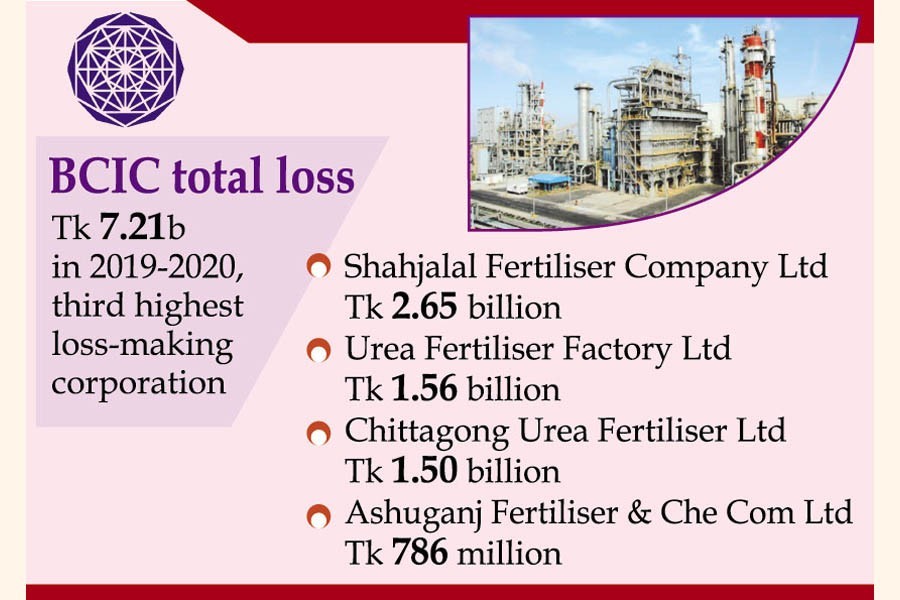Bangladesh Chemical Industries Corporation (BCIC) is sinking into atrophy as its financial and operational health has deteriorated, people familiar with the situation say.
The sorry state of the corporation has led the country to greater import-dependency for a few chemical products, especially fertilisers, the people concerned said.
Established under a presidential order with the objective of setting up an efficient operation of large and complex industrial units, especially in the chemical sector in 1976, the corporation has witnessed a gradual fall in the production of fertilisers over the years. But production costs have been gradually increasing.
The fast-deteriorating health of the state entity has brought down the number of its running enterprises to only 10 from 18 in 2000.
According to the official data, the corporation witnessed a financial loss of over Tk 7.21 billion in financial year of 2019-2020. It became the third highest loss-making corporation of the government during the last fiscal.
All of its units except one were making losses. Of them, Shahjalal Fertiliser Company Limited (SFCL) made the highest loss of over Tk 2.65 billion, followed by Urea Fertiliser Factory Limited (UFFL) Tk 1.56 billion, Chittagong Urea Fertiliser Limited (CUFL) Tk 1.50 billion, and Ashuganj Fertiliser & Chemical Company Ltd (AFCCL) Tk 786 million.
The same scenario prevails in non-fertiliser units. For example, Chhatak Cement Company Limited (CCCL) incurred Tk 496 million in losses, Karnaphuli Paper Mills Limited (KPML) Tk 214 million, Bangladesh Insulator & Sanitaryware Factory Limited (BISFL) Tk 182 million, Osmania Glass Sheet Factory Limited Tk 119 million and Palash Urea Factory Limited (PUFFL) Tk 79 million.
The only profit-making unit was Triple Super Phosphate Complex Ltd (TSPCL), whose bottom line amounted to Tk 349 million.
Officials and experts said an acute shortage of natural gas to the fertiliser units coupled with mismatch between production costs and selling price has been eroding the corporation's earnings.
They also said some other factors like the lack of reinvestment in the outmoded plants and introduction of modern technology and poor management made things worse.
It received state succor in the form of subsidy over the years to the tune of Tk 28.52 billion while the volume of bank loans stood at Tk 37.25 billion.
Seeking anonymity, a senior official at the BCIC said the survival becomes "very difficult" for an institution that spends more than it earns.
"It is now happening at the BCIC. Bold steps to cut back on the operational expenses are required. We need to change our mentality as there is scope for innovation," he said.
He also suggested considering alternative energy sources like coal-based fertiliser factories and amalgamation of the outmoded factories for slashing costs.
When contacted, BCIC's immediate past chairman Mustafizur Rahman said there are some policy and management-related issues that have been hurting the corporation.
Giving an example of folding some units during last decade, he said, the closure of the factories was done without following the labour laws.
The authorities then paid off the workers instead of declaring lay-off and it helped the workers go to the court and got back their jobs after years, he said.
"Now, the BCIC is disbursing huge amounts of money as their salaries. Those who were involved in shutting down the process did not scrutinise their decision on legal grounds," he said.
He also said the factories on average produced per tonne of urea at around Tk 24,000 but sold the fertiliser at the government-fixed price of Tk 14,000.
"The gap is quite large and the factories do not get it from the government. Many treat it as subsidy, which is wrong," he said.
He also said that almost all the factories under the corporation, except Shahjalal Fertiliser and JFCL became outmoded many years ago. As a result, mechanical fault, corrosion, leakage, environment pollution, and breakdown often occur and the efficiency of those units decreased gradually, according to the former BCIC chief.
The price of urea has remained static at Tk 14,000 per tonne since February 2013 when the government had reduced the price by Tk 4,000 from Tk 18,000 per tonne to support farmers.
The BCIC produced over 1.6 million tonnes of fertilisers through its enterprises 10 years back, but the production capacity waned to less than 0.9 million and the remaining portion of the country's 2.6 million requirement is met through import.
Chemical industry expert Mohammad Saber Ali said the government should form a body to scrutinise why the factories are not performing well and find out the reasons.
"We need to make reinvestment for Balancing, Modernisation and Replacement (BMR) on time to increase the productivity. Look at the KAFCO (Karnaphuli Fertiliser Company Ltd), why is it making profit? …it is because it is reinvesting to keep its unit up and running," he said.


